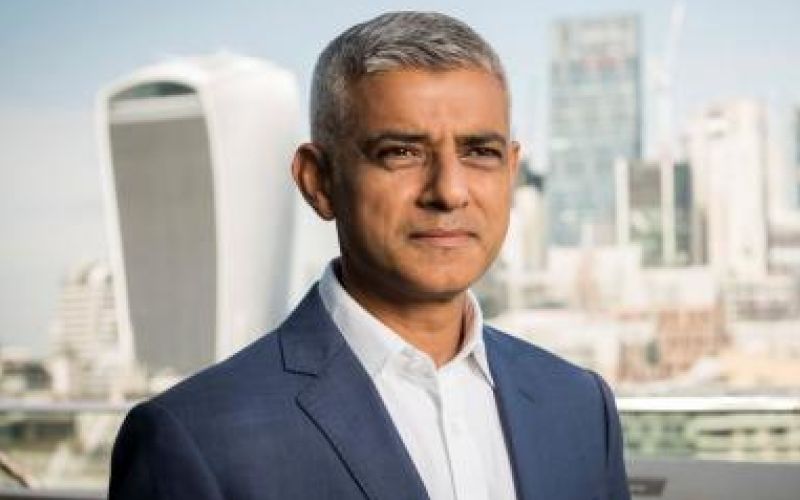The mayor of London is facing anger from disabled campaigners over his decision to set up a board of nearly 30 senior figures to oversee the recovery from coronavirus in the capital without including any members representing disabled people.
The aim of the London Recovery Board – which is co-chaired by the Labour mayor, Sadiq Khan (pictured), and the Labour chair of London Councils, Cllr Peter John – is to co-ordinate the planning for London’s long-term recovery from the coronavirus crisis.
Part of its job is to support communities that have been “most impacted by the virus” and to “narrow social, economic and health inequalities”.
But there is no representative of disabled people on the 29-strong board, even though its members include representatives from the London Resilience Faith Sector Panel, Operation Black Vote, management consultants Planet Communications, and The Royal Society for the Protection of Birds.
There was anger, frustration and disbelief from disabled Londoners and others after Disability News Service (DNS) revealed the lack of disability representation last week.
Alan Benson, chair of Transport for All, which campaigns for older and disabled people in the capital, said: “Just wow. Imagine not including women and the outcry.”
The Disabled Police Association said the mayor had obviously not read the latest statistics on the deaths of disabled people during the pandemic from the Office for National Statistics (see separate story) “which clearly show who was impacted the most”.
Artist-activist Jess Thom said that her “life, work and community” had been “drastically impacted” both by COVID-19 and some of the steps taken to recover from it, and she called on the mayor to “urgently” add disabled people and disabled-led organisations to the board.
Sofia Khan said on Twitter that disabled people had been “significantly affected” by COVID-19 and “to not have us represented properly at the same table as other agencies is discriminatory and shows how disabled ppl are an afterthought”.
Dr Hannah Barham-Brown, a wheelchair-user and deputy leader of the Women’s Equality Party, said there was “no excuse” for the omission, and added: “I could have given you a list of at least 20 amazing #disabled experts to bring into this.
“Incredibly disappointed that 23 per cent of the population have been forgotten.”
Disabled actor Ruth Madeley also spoke out on Twitter, saying: “The RSPB are part of this Recovery Board… yet disabled organisations are not.
“Now, I like birds as much as the next person, but disabled people need a seat at the damn table more than the local city wood pigeon.”
Keryn Seal, a member of the British blind football team that competed at London 2012, told the mayor to “hang your head in shame” and said that it “speaks volumes that disabled groups do not get a seat at the table but the RSPB do.
“This is 2020, where the rights of pigeons and swans are of higher importance than those with disabilities.”
And disabled campaigner Corry Shaw said on Twitter: “Everyone knows I am a huge supporter of @SadiqKhan but this is hugely disappointing from @MayorOfLondon. I’m really upset by this, it is indefensible.”
The failure of the mayor and London Councils comes despite the disproportionate impact of the pandemic on disabled people.
This week, DNS reports how the government has been accused of violating its obligation to protect the right to life under the European Convention on Human Rights, after “devastating” new official figures showed that disabled people have made up almost three-fifths of COVID-related deaths in England and Wales (see separate story).
It is just the latest piece of research to show the disproportionate impact, including a report by Inclusion London, which published research in June showing disabled people had faced the “grim effects” of discrimination and inequality in every area of their lives from the beginning of the pandemic.
The mayor’s office has yet to explain why there are no disabled people or representatives of DPOs on the board.
But it has insisted that it is committed to working with disabled people and DPOs, that it has engaged with disabled Londoners, and that the mayor’s equality and diversity advisory group – which includes representatives from DPOs – provides “advice and guidance” on the recovery programme.
Although the pan-London disabled people’s organisation Inclusion London is not a member of the London Recovery Board, it is a member of a sub-group of the board, the London communities strategy group.
A note from the editor:
Please consider making a voluntary financial contribution to support the work of DNS and allow it to continue producing independent, carefully-researched news stories that focus on the lives and rights of disabled people and their user-led organisations.
Please do not contribute if you cannot afford to do so, and please note that DNS is not a charity. It is run and owned by disabled journalist John Pring and has been from its launch in April 2009.
Thank you for anything you can do to support the work of DNS…

 Access to Work cuts risk ‘decimating’ disability arts movement, disabled artists and consultants warn
Access to Work cuts risk ‘decimating’ disability arts movement, disabled artists and consultants warn ‘Access to Work showed me a working life was still possible… now Keir Starmer has put that at risk’
‘Access to Work showed me a working life was still possible… now Keir Starmer has put that at risk’ Combined impact of different aspects of pandemic on disabled people ‘felt relentless’, Covid inquiry hears
Combined impact of different aspects of pandemic on disabled people ‘felt relentless’, Covid inquiry hears